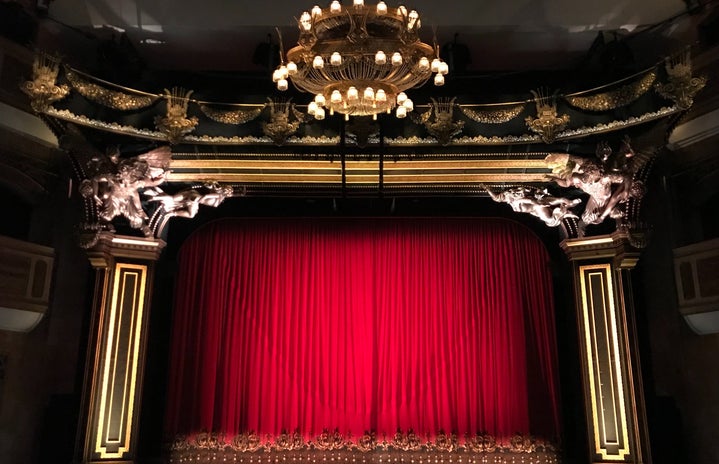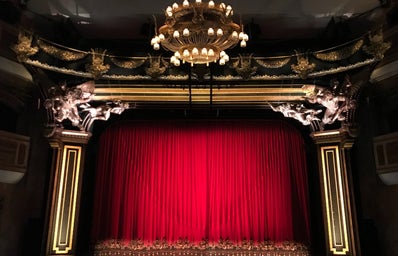In the words of Oscar Wilde, “I regard the theatre as the greatest of all art forms, the most immediate way in which a human being can share with another the sense of what it is to be a human being”.
Theatre for me, and I am sure for many is an emblem for passion, inspiration, and joy. Even as I am writing this article, I am currently listening to my musical theatre playlist, jumping between the worlds of Hamilton, Dear Evan Hansen, and Matilda. As for me, no matter whether I am sat in the stools of a London West End theatre, listening to musical soundtracks, watching a ballet, studying a classic theatre text, or simply planning my next theatre trip, it ignites a feeling within me- a feeling that cannot be described.
Throughout, the pandemic, I turned to the theatre. I realised my, somewhat, buried passion for all things theatre, and much to the dismay of my sister, of whom despised the fact that I would blast musical theatre songs 24/7, I found a new comfort that got me through the painful lockdown periods.
Though having said, this I would like to personally put my hands up and say that I cannot sing for the absolute life of me, that is something that I shall leave for the professionals; so, I mean can you really blame my sister for telling me “Shut-up” when I belt “Waving Through A Window”?
Theatre for many years has been spoken of as a dying artform. This is something that during this article, I aim to prove as outright inaccurate!
As an extremely brief timeline of the theatre, the first traces of theatre date back to the 6th century BC, during the time of the Ancient Greeks. The theatre of Ancient Greece consisted of three types of drama: tragedy, comedy, and the satyr play. Aristotle, the Greek philosopher, proposed a formula for dramatic playwriting, which was known as the “Three Unities”, combining time, place, and action. In 1576, Britain’s first playhouse “the theatre” was bult in Finsbury Fields, London. Fast-forwarding to the 1940s/1950s, this period was referred to as the “Golden Age” of theatre, as many musicals were debuted during this period. Golden age musicals included: The Wizard of Oz, A Star is Born…. All the way through to the modern-day theatre as we now know.
As time has clearly proven, theatre has survived throughout centuries of wars and crises, so why would we class theatre as dying now?
The pandemic caused, as of 13th March 2020, theatres across the globe to pull their curtains, turn out the stage lights, and hang up their dancing shoes. Resultantly, it appears it was not until these performances were ceased that many came to realise the true value of live performances.
However, we must not ignore the fact that the industry was severely impacted by the spread of the virus. Ticket sales in UK theatres fell by 93% in 2020. During this period, from February to March 2020, as the virus began to spread throughout Europe, ticket sales decrease by 14% year-on-year, resulting in 19% drop in revenue. Regarding the physical distancing requirements and closure of theatre venues, it meant that many performing arts institutions had to adapt to offer new digital services/ online streaming services. During this time, Shakespeare’s Globe called for urgent funding to avoid insolvency, many shows were closed and never reopened, shows were postponed, and the smaller theatres, as well as London’s West End, were thrown into a long period of uncertainty.
Despite acknowledging the fact that theatres are not a dying art, it may be necessary for the Performing Arts sector to redesign its strategies and fundamental business models, to ensure both economic survival and versatility through innovation. For example, through further marketing and communication, digital competencies, and campaigning for further government funding; in aiding not only the theatres recovery, but also investment into arts students and its talent.
Unfortunately, however, in 2021, the UK government approved a 50% funding cut for arts and design courses, with the education secretary of the time, Gavin Williamson, declaring that the money will be redirect towards STEM subjects. Devaluing the arts disempowers us as a society, it leaves us poorer, both culturally and economically. In line with the argument, ‘is theatre really a dying art”, perhaps we need to rather question is theatre being forced into becoming a dying art- not just as a natural progression, but rather lacks the vital support and recognition of its importance from the government.
Theatrical innovation (technical, aesthetic, artistic) has developed rapidly and in exciting ways; but imagine the steps that could be taken with further financial support; and, if the government realised that the theatre industry is a major UK international export, and a major contributor to its tourism.
Understanding theatre helps us to understand what it means to be human- past, present, and future. In this way, theatre acts as a mirror to society. Many forms of theatre being in the didactic form, meaning that they are intended to teach, particularly in having moral instruction as an ulterior motive. The German playwright Friedrich Schiller wrote that watching live theatre is a powerful piece of didacticism. He writes that “seeing something before our eyes is always more powerful than description. Therefore, the understanding of laws can be heightened if the stage is used to display their truths”.
I will always remember going to see an adaption of A Doll’s House by Henrik Ibsen, called ‘Nora’ in the Old Vic theatre, and I felt like I came out with a whole new mindset and appreciation for theatrical texts.
Theatre, overall, offers a chance for people to disappear from the outside world for a while. With the omnipresence of social media and the depressing aspects of the 21st century, the importance of attending theatre productions is more important now, than ever. Performances are a chance of escapism for its audience, a chance to be immersed in what can be described as an ethereal experience, a chance for all senses to be ignited.
Theatre is not a dying art; it just needs the support to help it innovative alongside the economy and society. Theatre will forever have my heart, in more ways than I can describe… and if you catch me crying at every curtain call, you did not….


